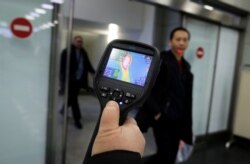China’s National Health Commission reported Tuesday that six people have died and nearly 300 have been infected with a new coronavirus.
The report came one day after the government confirmed the virus can spread from one person to another. The finding raises the possibility that the virus could spread quickly and widely.
Zhong Nanshan is a respiratory expert and the head of a Chinese government team. He said two people in Guangdong province in southern China caught the virus from family members, state media reported. Some medical workers were also found to have the virus, the newspaper China Daily reported.
Chinese President Xi Jinping called on the government to take every possible step to fight the disease.
“The recent outbreak of…coronavirus pneumonia in Wuhan and other places must be taken seriously,” Xi said, in his first statement on the crisis.
State television reported his comments.
WHO committee meeting
In Geneva, the World Health Organization announced it would call an Emergency Committee meeting on Wednesday to decide if the outbreak should be declared an international health crisis.
Such declarations are usually made for severe diseases that threaten to cross national borders and require medical teams from different countries to work together.
In recent years, international emergencies have been declared for crises such as the ongoing Ebola outbreak in the Democratic Republic of Congo and the Zika virus in the Americas in 2016.
The spread of the coronavirus comes as China enters its busiest travel period. Millions of people will travel for the Lunar New Year holiday.
The outbreak is believed to have started last month among people connected to a seafood market in Wuhan, a city in central China.
Zhong said the two people in Guangdong had not been to Wuhan, but became sick after family members had returned from the city, the China Daily reported.
Spreading overseas
The outbreak has health officials in other countries worried as millions of Chinese travel for Lunar New Year. Officials in Thailand and in Japan have identified three cases, all the result of recent travel from China.
South Korea reported its first case on Monday. A 35-year-old Chinese woman from Wuhan was found to be infected with the virus on arrival at Seoul’s Incheon airport. She has been isolated at a hospital in Incheon City, just west of Seoul, said the Korea Centers for Disease Control and Prevention.
On Tuesday, the United States confirmed its first case. At least three U.S. airports and six countries in Asia have started testing incoming airline passengers from central China for the virus.
Videos published on social media show people in protective clothing measuring the temperatures of plane passengers arriving in Macao from Wuhan. A Macao Health Bureau official confirmed over the phone that such exams are taking place in southern China.
Canada’s Chief Medical officer, Theresa Tam, said signs will be placed at airports in Toronto, Montreal and Vancouver in the coming days. Airport officials will ask people if they have traveled to the Wuhan area and if they feel sick.
“The Chinese lunar year is coming so out of…precaution that’s why we are putting out additional information for travelers,” Tam said.
Coronaviruses cause everything from the common cold to SARS, short for severe respiratory syndrome. SARS first infected people in southern China in late 2002 and spread to more than 20 other countries. The disease was blamed for nearly 800 deaths.
“In the early days of SARS, reports were delayed and covered up,” said an editorial in one newspaper. “That…must not happen again in China,” it also said.
Chinese president Xi Jinping told government agencies this week to immediately release information on the virus and deepen international cooperation.
I’m Susan Shand.
The Associated Press and the Reuters News Agency reported this story. Susan Shand adapted it for VOA Learning English. George Grow was the editor.
Write to us in the Comments Section or on our Facebook page.
________________________________________________________________
Words in This Story
respiratory – adj. of or relating to breathing or the organs used in breathing
outbreak – n. a sudden start or increase of fighting or disease; the violent or sudden start of something unwelcome
ongoing – adj. continuing
isolate – v. to put or keep someone or something in a place or situation that is separate from others
syndrome – n. a disease or disorder that involves a number of signs or conditions
epidemic - n. a large number of cases of a disease in a community at a given time
editorial – n. a commentary written by the leaders of a newspaper or magazine that gives an opinion on an issue








